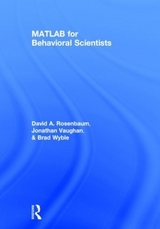
MATLAB for Behavioral Scientists
Seiten
2007
Lawrence Erlbaum Associates Inc (Verlag)
978-0-8058-6227-0 (ISBN)
Lawrence Erlbaum Associates Inc (Verlag)
978-0-8058-6227-0 (ISBN)
- Titel erscheint in neuer Auflage
- Artikel merken
Zu diesem Artikel existiert eine Nachauflage
Walks behavioral scientists through the computer programming process, using terms that are relevant to their concerns and appreciating their special programming needs.
Behavioral scientists use computers in virtually all their work—from data collection to analysis, presentation, and simulation. However, there has been no book written to date specifically for behavioral scientists on how to program with a general-purpose programming language. MATLAB for Behavioral Scientists is a tremendously valuable textbook that walks behavioral scientists through the computer programming process, using terms that are relevant to their concerns and appreciating their special programming needs.
Author David A. Rosenbaum, a cognitive psychologist with a Ph.D. in experimental psychology, introduces Matrix Laboratory (MATLAB), a powerful computer programming language with an active community of users engaged in many branches of science and engineering. Among its many attractive features, MATLAB offers high-level commands for performing calculations with large as well as small data sets and for generating publication-quality graphics. Throughout the text, Rosenbaum presents each new principle with one or more illustrations of usable code. In addition, each chapter begins with suggestions regarding which actions to perform, followed by the commands required to do so. The book easily functions as a reference source so that readers can turn to a section of interest and quickly obtain the information desired. An accompanying Web site lists programs and code output, complete with color, motion, and sound.
This textbook will grant behavioral scientists the intellectual freedom to perform virtually any computational function in solving problems, and consequently may allow practitioners to think, write, and speak more clearly.
Behavioral scientists use computers in virtually all their work—from data collection to analysis, presentation, and simulation. However, there has been no book written to date specifically for behavioral scientists on how to program with a general-purpose programming language. MATLAB for Behavioral Scientists is a tremendously valuable textbook that walks behavioral scientists through the computer programming process, using terms that are relevant to their concerns and appreciating their special programming needs.
Author David A. Rosenbaum, a cognitive psychologist with a Ph.D. in experimental psychology, introduces Matrix Laboratory (MATLAB), a powerful computer programming language with an active community of users engaged in many branches of science and engineering. Among its many attractive features, MATLAB offers high-level commands for performing calculations with large as well as small data sets and for generating publication-quality graphics. Throughout the text, Rosenbaum presents each new principle with one or more illustrations of usable code. In addition, each chapter begins with suggestions regarding which actions to perform, followed by the commands required to do so. The book easily functions as a reference source so that readers can turn to a section of interest and quickly obtain the information desired. An accompanying Web site lists programs and code output, complete with color, motion, and sound.
This textbook will grant behavioral scientists the intellectual freedom to perform virtually any computational function in solving problems, and consequently may allow practitioners to think, write, and speak more clearly.
Introduction. Interacting With MATLAB. Matrices. Calculations. Contingencies. Input-Output. Data Types. Modules and Functions. Plots. Lines, Shapes, and Images. Three-Dimensional Graphics. Animations. Sounds. Going On. References. Solutions for Selected Problems.
| Erscheint lt. Verlag | 24.4.2007 |
|---|---|
| Verlagsort | Mahwah |
| Sprache | englisch |
| Maße | 178 x 254 mm |
| Gewicht | 664 g |
| Themenwelt | Geisteswissenschaften ► Psychologie ► Allgemeine Psychologie |
| Geisteswissenschaften ► Psychologie ► Verhaltenstherapie | |
| Mathematik / Informatik ► Mathematik ► Computerprogramme / Computeralgebra | |
| Naturwissenschaften ► Biologie ► Humanbiologie | |
| Naturwissenschaften ► Biologie ► Zoologie | |
| Sozialwissenschaften ► Soziologie | |
| ISBN-10 | 0-8058-6227-7 / 0805862277 |
| ISBN-13 | 978-0-8058-6227-0 / 9780805862270 |
| Zustand | Neuware |
| Informationen gemäß Produktsicherheitsverordnung (GPSR) | |
| Haben Sie eine Frage zum Produkt? |
Mehr entdecken
aus dem Bereich
aus dem Bereich
wie Affekte innere Entwicklung ermöglichen
Buch | Softcover (2023)
Klett-Cotta (Verlag)
30,00 €



